Hygienic brushes, intended for cleaning teeth, are presented in the form of a thin rod-like base on which villi or bristles made of nylon are placed. The latter can be soft or hard, sparse or thick, and they can also differ in thickness and length.
The brushes are designed for more thorough oral hygiene. They make it possible to clean uneven interdental spaces, braces or dentures.
Record content:
-
1 Types of teeth brushes
- 1.1 Cylindrical
- 1.2 Conical
- 1.3 Curved
- 2 Application
-
3 Top manufacturers
- 3.1 Colgate Total
- 3.2 Lacalut
- 3.3 Oral-B
- 3.4 President
- 3.5 Curaprox
-
4 Rating
- 4.1 Oral-B Interdental Starter Kit
- 4.2 Colgate Total (2, 4, 5mm)
- 4.3 Lacalut Interdental
- 4.4 Curaprox CPS 457
- 4.5 PresiDent Soft sticks
- 5 Selection recommendations
- 6 Teeth Brush Videos
Types of teeth brushes
Teeth brushes are available in 3 versions. They differ from each other in the type of shaft, the stiffness and length of the bristles, as well as in their unique shape and special purpose. For everyday use with crowded crowns, it is advisable to use products with short villi.
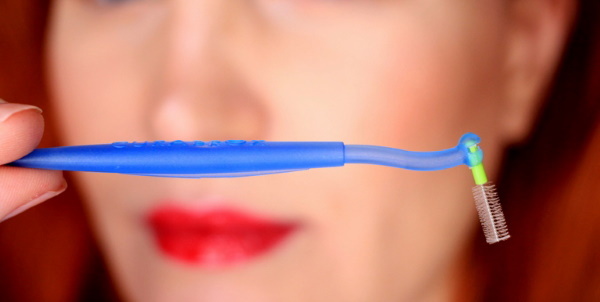
If the teeth are well positioned, a medium bristled brush will work. In the presence of a diastema, it is required to use a product with a long nap, starting from 3 mm. In case of increased sensitivity of teeth and periodontium, it is not recommended to use brushes with hard villi.
The bristles can be located on plastic or metal rods. If the periodontium is weakened or inflamed, it is best to use a product with a plastic base, since it is much more elastic and does not deform soft tissues.
Cylindrical
The pile along the base is of equal length. The product is suitable for cleaning the neck of the implant, wide spaces between the teeth. It can also be used for gum care.
The cost of cylindrical brushes is 200 - 400 rubles. The price depends on the manufacturer.
Conical
They are characterized by a non-standard conical shape. Long hairs are placed closer to the base of the brush. Moving to the top of the product, their height begins to decrease to 1 mm.
The cone-shaped brush is suitable for everyday cleaning with a normal dentition. Due to this shape, it can penetrate into all areas that are inaccessible to a classic brush. Their price starts from 300 to 600 rubles.
Curved
The main shaft with bristles and a handle has a semicircular shape. This type of brush is suitable for cleaning dentures and braces. The unusual design of the product makes it possible to easily penetrate the space between the surface of the crowns and the orthodontic construction.
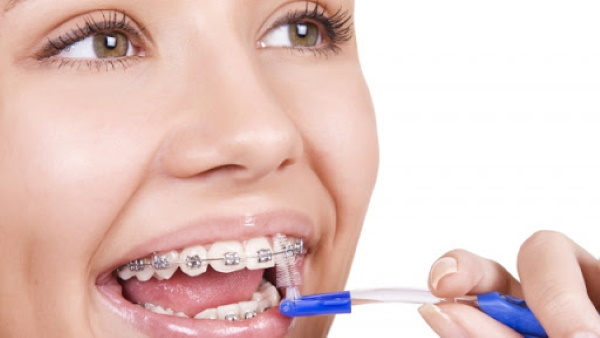
The model can cope with the plaque that is present on the clasps of the braces. Also, curved brushes may have a bristle, each bristle of which is bifurcated at the edge. This increases the cleaning efficiency. The price of the product varies between 400 - 900 rubles.
Application
Dental brushes are a versatile hygiene device that requires step-by-step instructions for obtaining maximum effect, as well as avoiding oral injuries cavity. During the period of cleaning the interdental space, the user does not need toothpaste.
The correct use of the toothbrush is described in the following points:
- Enamel needs to be cleaned of food debris with a regular toothbrush using toothpaste.
- Then you need to rinse the mouth with water and wet the brush.
- After that, without much effort, gently insert the brush rod between the teeth in the place where their bases are in contact with the gums until it is on the other side.
- At this stage, it is required to clean the interdental space with rotational-circular movements, without moving the rod between the teeth as in the case of flossing, as this can damage the enamel.
- Finally, gently remove the toothbrush and then rinse it and the mouth with water.
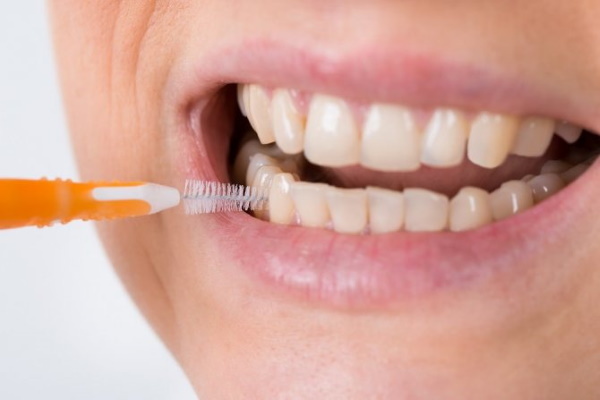
This method should be used when cleaning the tooth space between molars, canines and incisors, periodically rinsing the mouth with clean warm water from food debris removed from cracks.
After completing the procedure, the brush should be thoroughly rinsed under running water, and then covered with a cap and removed to the designated place. Those who use braces, in addition to the usual cleaning of the oral cavity, will also need to clean the structure to straighten the teeth.
Further manipulations are carried out with an interdental device of a conical shape, which allows you to easily penetrate closely to the locks of the bracket system.
For high-quality plaque removal from braces, it is recommended to use the following instructions:
- To process all locks, the device must be moved back and forth.
- Then you will need to initially introduce the brush under the arc from the outside, and then from the inside, cleaning the spaces in a circular motion.
- After completing the above procedures, the brush and oral cavity will need to be rinsed with warm water.

If it is difficult to enter the interdental space of a hygiene item, it is recommended to use a brush with a smaller villi diameter. Despite the fact that the interdental instrument looks like new, it should be changed quite often, once every 8 to 12 days.
The first days of using a hygiene item are adaptive and may be accompanied by bleeding in most people. The inconvenience will end in a week, and the use of the rinse aid will speed up the habituation process.
Severe bleeding, inflammation of the gums, hypersensitivity indicates that the hygiene item was chosen incorrectly. In this case, you should abandon its use and, contacting a specialist, choose the right option for brushing your teeth.
Top manufacturers
Teeth brushes are produced by a lot of manufacturers. Their products are characterized by excellent quality, while they are made from materials that are safe for human health.
Colgate Total
The products of the Swiss company Colgate are in great demand among users. They differ from other manufacturers in that the products come in a set, which includes brushes with nap of different lengths.
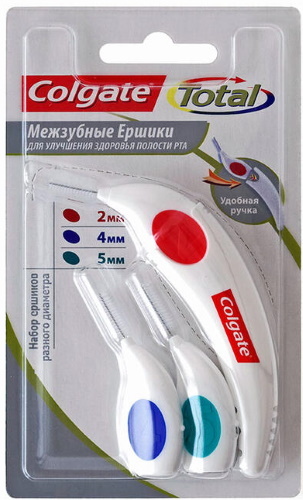
Due to this, it is permissible to use them for different purposes: cleaning the periodontium, crowns and structures. Their price varies within 270 rubles.
Lacalut
The German company Lacalut produces very high quality brushes, which are characterized by a metal rod. The latter is based on a special hypoallergenic alloy. To reduce the risk of trauma while brushing your teeth, the base of the product is covered with insulating plastic.
Due to this, it is permissible to use the products if there are amalgam fillings or metal crowns. The cost of such brushes varies between 270 - 350 rubles.
Oral-B
The American manufacturer Oral-B manufactures 2 types of brush: cylindrical and conical. They are sold in a special container, which is characterized by a compact size. Such a container holds only one product, which is quite convenient when traveling. The price of the kit reaches 250 - 400 rubles.
President
The Italian manufacturer President produces curved brushes. They have a flexible shaft and a wide, semi-circular handle. Thanks to this, the product can easily take care of orthodontic structures.
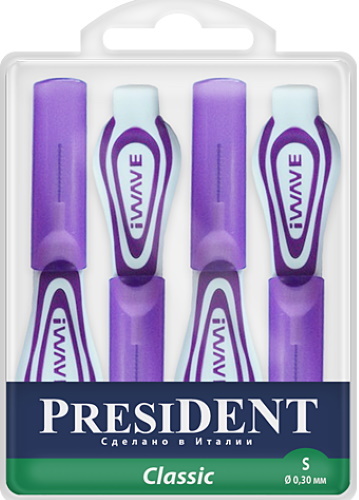
The average price for a set varies within 350 rubles.
Curaprox
The Swiss company produces brushes from a special alloy, which is used in the process of manufacturing surgical instruments. Therefore, the products are characterized by a long service life. The cost of the brush reaches about 600 rubles.
Rating
Teeth brushes are relatively new, but they quickly became popular among users. Therefore, there are many manufacturers of these devices.
The most popular manufacturers are: Colgate, Oral-b, Lacalut, President, Curaprox. To understand which company is suitable for the user, you should consider the following ranking of popular and high quality models.
Oral-B Interdental Starter Kit
An excellent kit that consists of the following components:
- interdental brush holder;
- replaceable conical nozzle;
- replaceable cylindrical nozzle.
Food debris located in wide gaps between teeth, around braces, implants or bridges can be easily removed with a cylindrical attachment. To clean narrow and hard-to-reach places, use the conical nozzle, which will ideally clean the oral cavity.
The ergonomic grip grip fits perfectly in the hand, which allows for more precise and easy manipulation while cleaning teeth. Such a set is purchased 1 time, after that you only need to change the attachments, which are sold in abundance in stores for 6 pieces. packaged.
Characteristics:
- diameter of the conical brush - 2.7 mm;
- diameter of a cylindrical brush - from 3 to 6.5 mm;
- the length of the brushes - 2.5 cm;
- brush length - 18.5 cm;
- set cost - 250 rubles.
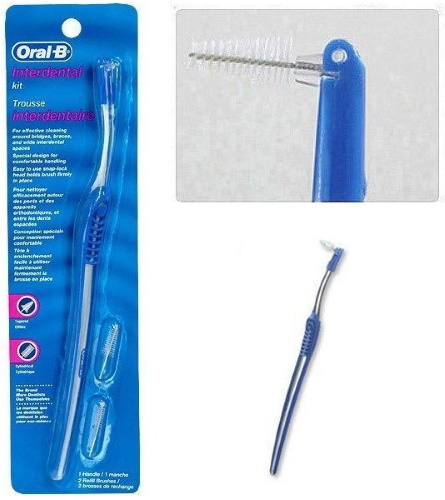
Advantages:
- affordable price;
- nozzles in the amount of 2 pcs. different shapes;
- comfortable handle-holder;
- a good starter kit with the right equipment.
Flaws:
- quick wear of nozzles;
- may not be suitable for very narrow gaps between teeth.
Colgate Total (2, 4, 5mm)
The set will allow you to keep clean not only the tooth spaces, but also the orthodontic structures.
Thanks to the kit, which includes 3 nozzles with different bristle diameters, you can easily clean the areas in need of the oral cavity:
- 4 and 5 mm nozzle cleans braces, dentures and bridges;
- The 2 mm nozzle cleans the interdental space well.
The line includes a set consisting of 3 identical brushes with a diameter of up to 2 mm. The set includes 3 attachments with a small plastic handle and a handle-holder that can be easily removed.
The brush with the handle is made in the shape of a curved drop, which can be easily taken with the index and thumb, and can also be used without a holder. The plastic case can easily replace the storage container.
To do this, it will be enough to shift the brush head inward, which will make it more compact and allow you to easily place it in your purse or pocket.
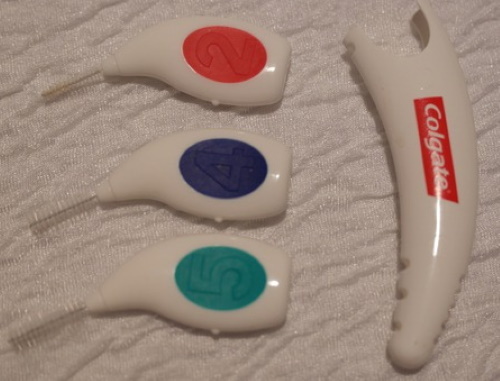
Such a set is very convenient to take with you to a restaurant, cafe or just to visit, where there is no way to clean the mouth immediately after a meal, since this requires only warm water. The average price fluctuates around 220 rubles.
The set is characterized both positively and negatively:
| pros | Minuses |
| Good equipment | The brush bends easily |
| Compactness | Wire with bristles becomes unusable very quickly |
| Nozzles of various diameters | |
| Ability to clean briquettes | |
| Budget price |
Lacalut Interdental
The German company Lacalut has won the trust not only of ordinary citizens, but also of dentists. In addition to mouthwash, toothpaste, toothbrush and floss, it produces interdental brushes. The line includes 4 sets with diameters from 2 to 4 mm in the amount of 5 pcs.
The bristles are made of high quality nylon and are attached to a surgical alloy wire covered with insulating plastic. This combination completely eliminates the risk of electrostatic discharge and helps to avoid unpleasant sensations.
The cylindrical brushes are attached to a small non-removable plastic handle. In addition, the kit includes a transparent cap that easily attaches to the back of the handle, extending it for easier access to hard-to-reach places.
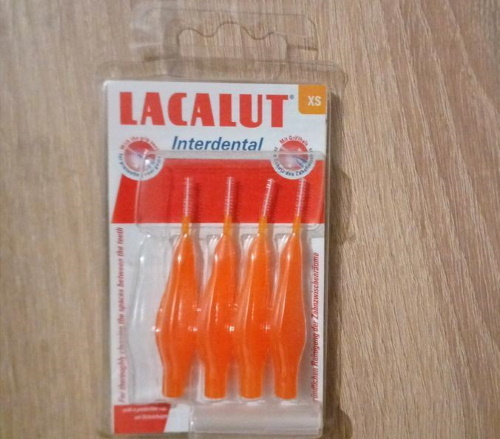
A suitable bristle diameter can be selected depending on the purpose. The XS and S sizes are good for cleaning the interdental space, while the M and L are suitable for people with braces. Some people use several kits at once to achieve maximum effect. The price of the product is 350 rubles.
The advantages of the device include effective removal of food debris and plaque, the choice of the diameter of the bristles, and also the fact that it is suitable for braces.
The disadvantages are considered to be quick wear and tear and an inconvenient removable handle.
Curaprox CPS 457
This brush set consists of the following components:
- 4 removable brushes of various diameters;
- travel case;
- handle holder.
The handle is made of high quality plastic, has an ergonomic shape for maneuvering in hard-to-reach places. The attachment is attached to the handle with a click, which allows you to securely combine the elements of the structure.
The nylon bristles are silicone coated, made of wire, which includes a medical alloy. This allows you to effectively remove plaque residues without causing injury to the gums.
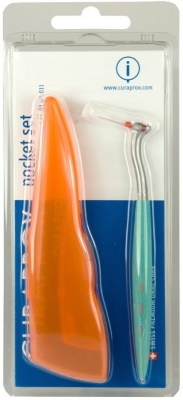
The storage travel case is equipped with ventilation holes so that bacteria do not grow on the surface of the brush. The price of a hygiene item is 900 rubles.
The advantages of products are:
- 4 removable nozzles;
- high quality materials;
- stylish design with travel case;
- removable ergonomic handle;
- cleaning the oral cavity without causing injury.
The disadvantages include the high price.
PresiDent Soft sticks
PresiDent brushes are used not only by those who have braces, crowns and bridges, but also by those who thoroughly monitor the condition of the oral cavity. S-size bristles can easily penetrate the narrowest crevices of the interdental space.
The brush does not contain metal components, so you can use it every day without fear of getting a current discharge. The stiffness of the bristles is low, so they remove plaque and bacteria around the gums and massage them pleasantly.
Despite all their fragility and small size, one package is enough for a long time. The kit includes a mini-container that allows you to conveniently transport and store the brushes. The price ranges from 350 rubles.
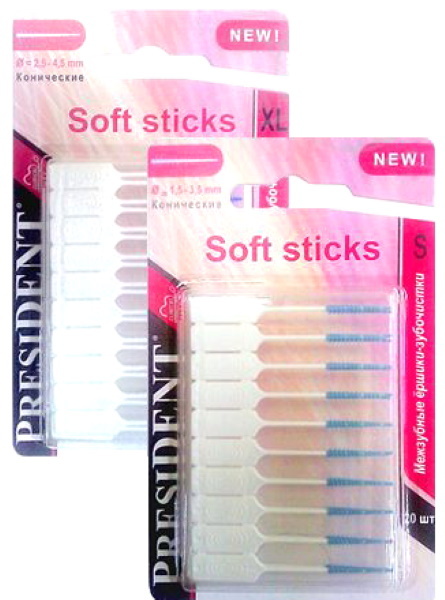
The advantage is considered compactness, the absence of metal components. Disadvantages include quick brush wear and a short handle.
Selection recommendations
Consult a professional to select an interdental cleaning device. Only a dentist can determine the general condition of the oral cavity, the type of jaw, the presence of orthodontic systems and will select a suitable brush for teeth.
Most often, for people with a standard jaw structure, dentists recommend using models with an average length of villi. If the patient has no gaps between the incisors, the villi can reach up to 3 mm.
When a patient is using dentures, braces or other systems, the teeth should be cleaned with several instruments in turn.
After talking with a specialist, you should choose the right set of brushes for both adults and children. If necessary, or due to the absence of a dentist, you can independently determine the required shape of the hygiene item.
The parameters that should be taken into account when choosing a brush yourself are displayed in the following paragraphs:
- Villi length. This criterion is one of the most important, because in the absence of gaps between the teeth, you should choose a device with a short pile of up to 1 mm, and vice versa. The dental brush can be used when the orthodontic structures are installed. If there is a diastema, it is recommended to choose bristles with a length of 3 mm or more.
- Bar length. Manufacturers produce a wide range of rods, so they can be found in 6 types in stores. When choosing a hygiene item, you need to take into account the age of the user, since for the smallest, a brush with size S is suitable, which will be very comfortable to hold in small hands. For adults, products are provided in medium and large sizes, designated as L and XL.
-
Rigidity. This criterion is influenced by the sensitivity of the gums and tooth enamel. If bleeding begins when brushing your teeth, it is better to choose a brush with softer bristles. If there are no problems, you can use a brush that has an average hardness of the villi. During the first use of the instrument, there may be blood in the oral cavity, which is considered normal and should go away within a few days after the gums get used to it.
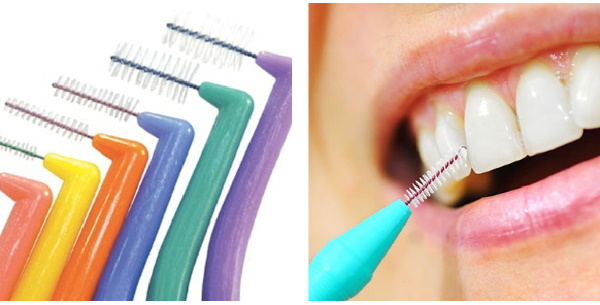
- Shaft and bristle volume. The choice affects the age of the user and the structural features of his jaw. Most people prefer small, neat models that easily fit into narrow crevices. But there are those who need a large, large handle that won't slip out of your hand. The diameter of the bristles is influenced by both the position of the teeth and the presence of problems with the gums and braces.
- Handle and material from which it is made. The tool for cleaning the oral cavity is available in 2 versions: metal and plastic. In the first case, the brush has high strength and is suitable for long-term use. But this model is not suitable for children, as it can damage the gums if used improperly. Plastic handles are more versatile as they do not cause allergies and are recommended for people with stomatitis.
For many people, daily hygienic cleaning of their teeth is carried out with a toothbrush and toothpaste. At the same time, they are enough if the brush is chosen correctly and the dentition is even.
But if there are braces, dentures, or there are uneven interdental spaces, more in-depth oral hygiene is required. For these purposes, special brushes are suitable that do not slip, are convenient to use and are hypoallergenic.
Teeth Brush Videos
Dental brushes and floss for cleaning teeth:
